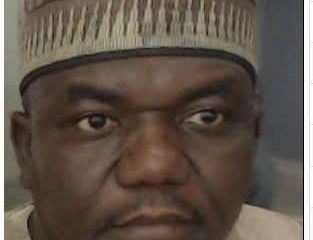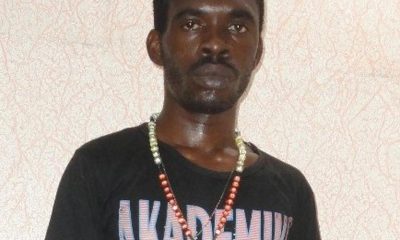International
Malawi president Chakwera concedes election defeat

Malawi’s President Lazarus Chakwera conceded defeat Wednesday in last week’s election, saying in an address to the nation that it was clear his rival Peter Mutharika had an “insurmountable lead”.
The former pastor took power in 2020 elections when he defeated the then-president Mutharika, a constitutional law expert from the Democratic Progressive Party.“A few minutes ago, I called Professor Mutharika to wish him well,” Chakwera said just hours before the election authority was due to announce the final results of the September 16 election.
Ahead of the announcement, “it was clear that my rival Peter Mutharika has an insurmountable lead over me,” said Chakwera, 70, from the Malawi Congress Party (MCP).
The dire state of the economy dominated the election in the small southern African country, with critics accusing Chakwera of mismanagement and indecisiveness and also failing to tackle corruption and deliver on promises to create jobs.
During his term, costs soared in the agriculture-dependent and rural nation, with inflation reaching 33 percent and the price of staple food maize and of fertiliser jumping, a key talking point at the poll.
“In the days that remain, I want you to know that I am committed to a peaceful transfer of power,” Chakwera said. “I know that many of you who supported my campaign for reelection will be disappointed.” Vanguard
International
Kemi Badenoch condemns UK recognition of Palestinian State

Conservative Party Leader, Kemi Badenoch, has criticised Prime Minister Keir Starmer’s decision to formally recognise the State of Palestine, describing it as “absolutely disastrous” and a move that rewards terrorism without addressing the plight of hostages in Gaza or the suffering of civilians caught in the conflict.
In a post on her X platform on Sunday, September 21, Badenoch, MP for North West Essex, accused Starmer of lacking a coherent plan for the country and instead pandering to “the hobby horses of the Labour left” to maintain power.
She wrote: “Rewarding terrorism with no conditions whatsoever put in place for Hamas leaves hostages languishing in Gaza and does nothing to stop the suffering of innocent people caught in this war.”
She further argued that Labour’s recognition of Palestine was part of a broader pattern of misplaced priorities, adding: “They cannot fix the NHS, so they push assisted suicide. They cannot create jobs for young people, so they give them votes at 16. They cannot sort out immigration, but they will recognise Palestine instead.”
Badenoch also criticised Starmer’s record on foreign affairs, recalling the payment of £35bn in reparations to Mauritius and the surrender of the Chagos Islands, which she framed as evidence of poor judgement.
“Everything we are seeing is a consequence of a Prime Minister who has no plan for the country and no judgement,” she said. “He will spend the next four years delivering the hobby horses of the Labour left to stay in power and leave a huge mess for us to clean up.”
Starmer, MP for Holborn and St Pancras, had earlier announced that the UK’s recognition of Palestine was aimed at reviving “the hope of peace for the Palestinians and Israelis, and a two-state solution.”
International
UK, Australia, Canada recognise Palestinian state

Britain, Australia, and Canada on Sunday recognised a Palestinian state in a seismic shift in decades of Western foreign policy, triggering swift Israeli anger.
Portugal was also to recognise Palestinian statehood later Sunday, as Israel came under huge international pressure over the war in Gaza triggered almost two years ago by the October 7, 2023, Hamas attack.
“Today, to revive the hope of peace for the Palestinians and Israelis, and a two-state solution, the United Kingdom formally recognises the State of Palestine,” UK Prime Minister Keir Starmer said in a message on X.
Britain and Canada became the first G7 countries to take the step, with France and other nations expected to follow at the annual UN General Assembly, which opens Monday in New York.
“Canada recognises the State of Palestine and offers our partnership in building the promise of a peaceful future for both the State of Palestine and the State of Israel,” Canadian Prime Minister Mark Carney wrote on X.
It is a watershed moment for Palestinians and their decades-long ambitions for statehood, with the most powerful Western nations having long argued it should only come as part of a negotiated peace deal with Israel.
But the move puts those countries at odds with the United States and Israel, with Israeli Prime Minister Benjamin Netanyahu reacting angrily and vowing to oppose it at the UN talks.
Calls for a Palestinian state “would endanger our existence and serve as an absurd reward for terrorism,” Netanyahu said Sunday.
A growing number of longtime allies have shifted positions, as Israel has intensified its Gaza offensive, vowing to eliminate the Hamas Palestinian militants.
The Gaza Strip has suffered vast destruction, a spiralling death toll, and a lack of food that has sparked a major humanitarian crisis since the start of the conflict, which has drawn an international outcry.
The UK government has come under increasing public pressure to act, with thousands rallying every month on the streets. A poll released by YouGov on Friday showed two-thirds of young Britons aged 18 to 25 supported Palestinian statehood.
Deputy Prime Minister David Lammy acknowledged at the UN in July that “Britain bears a special burden of responsibility to support the two-state solution”.
Over a century ago, the UK was pivotal in laying the groundwork for the creation of the state of Israel through the 1917 Balfour Declaration.
Three-quarters of UN members already recognise Palestinian statehood, with over 140 of the 193 having taken the step.
Starmer said in July that his Labour government intended to recognise a Palestinian State unless Israel took “substantive” steps, including reaching a ceasefire in Gaza, getting more aid into the territory, and confirming it would not annex the West Bank.
Starmer has also repeatedly called on Hamas to release the remaining hostages they captured in the 2023 attack, and is expected to set out new sanctions on the Palestinian militants.
Lammy told the BBC on Sunday that the Palestinian Authority — the civilian body that governs in areas of the West Bank — had been calling for the move for some time, “and I think a lot of that is wrapped up in hope”.
“Will this feed children? No, it won’t, that’s down to humanitarian aid. Will this free hostages? That must be down to a ceasefire,” he said.
But Lammy said it was an attempt to “hold out for” a two-state solution.
Palestinian foreign minister Varsen Aghabekian Shahin told AFP last week: “Recognition is not symbolic.”
“It sends a very clear message to the Israelis on their illusions about continuing their occupation forever,” she added.
Hamas’s 2023 attack on southern Israel resulted in the deaths of 1,219 people, most of them civilians, according to an AFP tally of official figures.
Israel’s retaliatory campaign has killed at least 65,208 people, also mostly civilians, according to figures from the Gaza health ministry that the United Nations considers reliable.
Portugal said that it would also formally declare its recognition in New York on Sunday.
“By acting now, as the Portuguese government has decided, we’re keeping alive the possibility of having two states,” Portuguese President Marcelo Rebelo de Sousa said.
Channels/AFP
International
Burkina Faso, Mali, Niger quit ICC, set up Sahelian court

Burkina Faso, Mali and Niger have taken a bold step to finalize their withdrawal from International Criminal Court, (ICC)
For decades, the ICC had been under criticism of being a tool of Western countries set up to hunt countries opposed to imperialist hegemony.
The three Sahelian countries decision is as a result of growing desire for regional autonomy and self-governance.
In a meeting held in Niamey, Niger, on September 16, the ministers agreed to establish a new regional court, the Sahelian Criminal Court for Human Rights, which will handle cases related to international crimes, terrorism, and organized crime.
The decision to leave the ICC stems from deep-seated concerns about the court’s structure and practices, with Niger’s acting Prime Minister, General Mohamed Toumba, criticizing the ICC for functioning as “an instrument of repression against African countries” that often acts “without evidence or on false grounds of serious and widespread human rights violations.”
He emphasized the need to “reconsider participation in the Rome Statute,” the treaty that established the ICC.
According to sources, the legal documents for withdrawal have been prepared, and a formal announcement is expected soon. While the withdrawal process will take a year to become effective after official notification, ongoing investigations and cases initiated before the withdrawal will remain valid.
The proposed Sahelian Criminal Court will focus on key issues affecting the region’s security and stability, including international crimes, terrorism, and organized crime.
This development reflects the Confederation of Sahel States’ (CSS) increasing emphasis on regional sovereignty, legal autonomy, and resistance to perceived neocolonial interference.
The move follows recent ICC actions in the region, including the sentencing of Al-Hassan Ag Abdoul Aziz, a former member of the Islamist police in Timbuktu, to ten years in prison for war crimes and crimes against humanity.
The ICC continues to pursue Iyad Ag Ghaly, the leader of the jihadist group Jamaat Nasr al-Islam wal Muslimin (JNIM), who remains on its international wanted list.
Moreso, the African Sahel region has experienced a surge in political instability over the past five years, marked by a series of coups d’état in multiple countries.
A total of five successful military coups have taken place in Mali, Burkina Faso, Guinea, Niger, and Gabon, while constitutional coups have occurred in Tunisia, Chad, and Sudan.
Several countries, including Gambia, the Central African Republic, Sierra Leone, and São Tomé and Príncipe, have faced attempted coups during this period, highlighting the region’s vulnerability to political upheaval.
However, this significant step by the Sahel nations signals a major shift in the region’s approach to justice and accountability, with potential implications for the broader international community.
-

 Entertainment5 days ago
Entertainment5 days agoDavido joins recording academy as Grammys voting member
-

 News3 days ago
News3 days agoFBI offers $10,000 reward for information leading to the arrest of Nigerian man accused of cybercrime
-

 News5 days ago
News5 days agoEx-Legislative Aide Jailed Eight Years for N120.5m Employment Scam in Abuja
-

 News2 days ago
News2 days agoPolice deny killing suspected armed robber in Benue
-

 News5 days ago
News5 days agoNigerian man sentenced to 10 years imprisonment for drug trafficking in India
-

 Business3 days ago
Business3 days agoDangote Refinery sacks all Nigerian workers 24 hours they joined PENGASSAN
-

 Politics4 days ago
Politics4 days ago‘Voice of reasoning has prevailed’- Atiku reacts to Natasha’s return to senate
-

 News4 days ago
News4 days agoAlleged N400m fraud: IGP seeks bench warrant against Andy Uba
-

 News4 days ago
News4 days agoNSITF decries 150 deaths in construction accidents, calls for strict safety measures
-

 Business3 days ago
Business3 days agoGateway Airport: Value Jet commences commercial flight October 7
-

 Entertainment3 days ago
Entertainment3 days agoNollywood star Mercy Aigbe loses her mother








